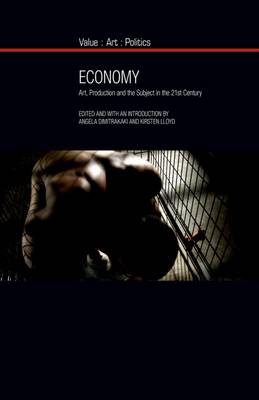
- Retrait gratuit dans votre magasin Club
- 7.000.000 titres dans notre catalogue
- Payer en toute sécurité
- Toujours un magasin près de chez vous
- Retrait gratuit dans votre magasin Club
- 7.000.0000 titres dans notre catalogue
- Payer en toute sécurité
- Toujours un magasin près de chez vous
Economy
Art, Production and the Subject in the 21st Century
Description
What happened in art following the consolidation of capitalist globalisation after 1989? Drawing on work in art history, curating, critical theory, political economy and sociology, essays in Economy: Art, Production and the Subject in the 21st Century frame and substantiate the increasing attendance to economic relations as a defining trend in contemporary art's history and one that brought to an end the hegemony of the cultural subject encountered in postmodern discourse.
Contributions include reflections on art in its relation to property as well as to speculation and finance, immaterial labour and the avant-garde, the lessons of the past in pursuing an aesthetics of the economy, the ethics of care and the role of the art document, queer politics and class, the new feminist critique of economic subjects, migration, precarity and empowerment, the ambivalence of the commons, and a range of perspectives on the possibility of opposition, in the art world and beyond, to the biopolitical rule of global capital as the arbiter of human relations.
Building on, extending and querying the curatorial project ECONOMY (Edinburgh and Glasgow 2013), the book puts forward a proposition that cuts across a number of 'turns' in the art of the past two decades, including socially engaged practices, seeking to connect localised approaches with the broader organisation of production and the unprecedented apparentness of the economy in the passage from the 20th to the 21st century.
Contributors: Massimo de Angelis, Angela Dimitrakaki, Melanie Gilligan, Kirsten Lloyd, Renate Lorenz, Dimitris Papadopoulos & Vassilis Tsianos, Andrea Phillips, John Roberts, Alberto Toscano, Gregory Sholette, Marina Vishmidt.
Editors: Angela Dimitrakaki is Senior Lecturer in Contemporary Art History and Theory at the University of Edinburgh
Kirsten Lloyd is Teaching Fellow in History of Art at the University of Edinburgh and Associate Curator at Stills, Edinburgh
Spécifications
Parties prenantes
- Editeur:
Contenu
- Nombre de pages :
- 256
- Langue:
- Anglais
- Collection :
- Tome:
- n° 11
Caractéristiques
- EAN:
- 9781800348936
- Date de parution :
- 02-02-21
- Format:
- Livre broché
- Format numérique:
- Trade paperback (VS)
- Dimensions :
- 155 mm x 231 mm
- Poids :
- 385 g

Les avis
Nous publions uniquement les avis qui respectent les conditions requises. Consultez nos conditions pour les avis.





